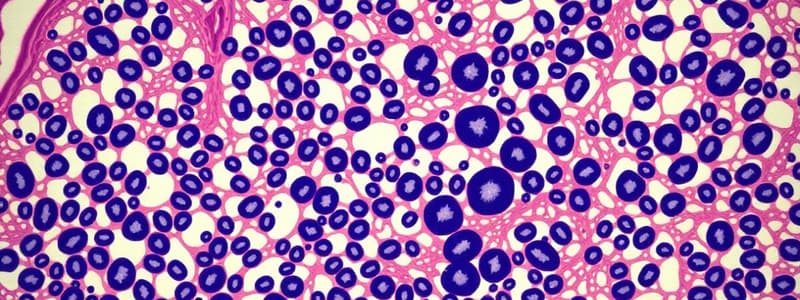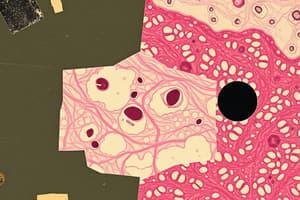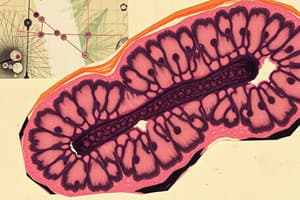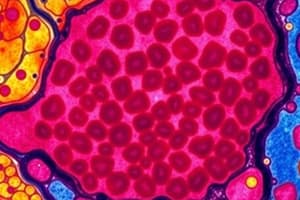Podcast
Questions and Answers
What term describes the process by which epithelium changes from one type to another due to chronic irritation?
What term describes the process by which epithelium changes from one type to another due to chronic irritation?
- Metaplasia (correct)
- Neoplasia
- Hypertrophy
- Dysplasia
Which germ layer is the respiratory system epithelium derived from?
Which germ layer is the respiratory system epithelium derived from?
- Mesoderm
- Ectoderm
- Endoderm (correct)
- Neuroectoderm
What is the primary function of microvilli on absorptive epithelium?
What is the primary function of microvilli on absorptive epithelium?
- Aid in cellular respiration
- Provide structural support
- Facilitate cell signaling
- Increase surface area for absorption (correct)
Which of the following statements accurately describes stereocilia?
Which of the following statements accurately describes stereocilia?
What modification is specifically associated with the surface coat of absorptive epithelium in the small intestine?
What modification is specifically associated with the surface coat of absorptive epithelium in the small intestine?
What is the primary function of cilia in the respiratory tract?
What is the primary function of cilia in the respiratory tract?
Which junction type is primarily responsible for sealing adjacent cells together?
Which junction type is primarily responsible for sealing adjacent cells together?
Which structure is characterized as non-motile and involved in absorption?
Which structure is characterized as non-motile and involved in absorption?
What is the main component of cilia that allows them to be motile?
What is the main component of cilia that allows them to be motile?
What is the function of gap junctions?
What is the function of gap junctions?
Which type of junction couples intermediate filaments to the basement membrane?
Which type of junction couples intermediate filaments to the basement membrane?
Which disease is associated with damage to macula adherens?
Which disease is associated with damage to macula adherens?
Which of the following junctions is classified as an anchoring junction?
Which of the following junctions is classified as an anchoring junction?
Which characteristic is not true about epithelial tissue?
Which characteristic is not true about epithelial tissue?
What are the products of the basement membrane's composition?
What are the products of the basement membrane's composition?
Which statement correctly defines the polarity of epithelial cells?
Which statement correctly defines the polarity of epithelial cells?
Which tissue type is primarily responsible for transmitting information within the body?
Which tissue type is primarily responsible for transmitting information within the body?
What is the primary function of epithelial tissue?
What is the primary function of epithelial tissue?
What type of epithelium consists of multiple layers of cells?
What type of epithelium consists of multiple layers of cells?
How does epithelial tissue receive nourishment?
How does epithelial tissue receive nourishment?
What happens to epithelial cells during gland formation?
What happens to epithelial cells during gland formation?
Flashcards are hidden until you start studying
Study Notes
Overview of Histology
- Tissues are groupings of cells performing specific functions.
- Four basic tissue types: epithelial, muscle, nerve, and connective.
Epithelial Tissue
- Covers body surfaces, lines cavities, and forms glands.
- Principal characteristics of epithelial cells:
- Adhere through cell junctions.
- Exhibit polarity: apical, lateral, and basal.
- Basal surface attached to a basement membrane.
Basement Membrane
- Specialized structure between basal epithelial cells and connective tissue.
- Composed of two layers:
- Basal lamina (produced by epithelium).
- Reticular lamina (produced by connective tissue).
Structure of Epithelium
- Can be simple (single layer) or stratified (multiple layers).
- Cell adherence via intercellular junctions.
- Lacks blood vessels; receives nutrients through diffusion.
- High regenerative capacity.
- Nuclei shape matches cell shape (oval in columnar, round in cuboidal, flat in squamous).
- Can invaginate to form glands.
Metaplasia
- Morphological and functional changes in epithelium type.
- Derived from all three germ layers:
- Ectoderm: Skin
- Endoderm: Respiratory and digestive systems
- Mesoderm: Cardiovascular system.
Surface Modifications
- Glycocalyx: Absorptive surface coat, acting as receptor sites.
- Microvilli: Finger-like projections increasing absorption surface area.
- Stereocilia: Long, non-motile projections in the inner ear, enhancing surface area.
- Cilia: Hair-like, motile projections moving particles in a specific direction.
Comparison of Surface Modifications
- Microvilli increase surface area for absorption, found in the intestine and kidney.
- Cilia are motile, aiding in movement of particles, found in the respiratory tract and uterine tubes.
Intercellular Junctions (Junctional Complexes)
- Zonula occludens (tight junction): Seals adjacent cells.
- Zonula adherens: Anchors microfilaments to basement membrane at cell-cell adhesion sites.
- Macula adherens (desmosomes): Anchors intermediate filaments for cell-cell adhesion.
- Gap junctions: Allow passage of ions and molecules between adjacent cells.
Clinical Relevance
- Pemphigus: Skin disease linked to damage of macula adherens.
- Celiac disease: Atrophy of microvilli leads to decreased intestinal absorption and chronic diarrhea.
Studying That Suits You
Use AI to generate personalized quizzes and flashcards to suit your learning preferences.




